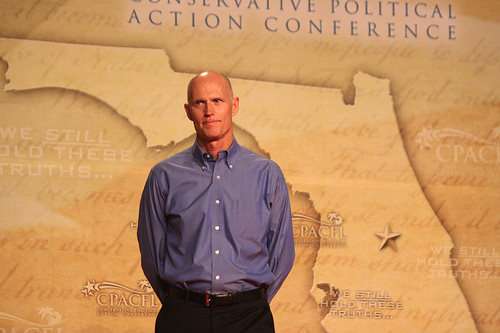ObamaCare Opponent Rick Scott to Proceed With Health Law's Medicaid Expansion in Florida

Late this afternoon, Florida Governor Rick Scott announced that his administration would proceed with an expansion of Medicaid under ObamaCare. It's a dramatic reversal for Scott, a former health care executive and outspoken opponent of ObamaCare who spent an estimated $5 million of his own money trying to stop the health law before it was passed.
It's also a reversal from what he promised his own advisers, says Michael Cannon, a Cato Institute health policy analyst who served on the health care task force for Governor Scott's gubernatorial transition team.
During the transition period, Cannon says he "pushed hard" for the health care task force to recommend that Scott not implement any part of ObamaCare. When the time came to make that recommendation directly to Scott, Cannon says it didn't require a hard sell. Scott quickly declared that he had no plans to implement any part of the health law in Florida. "I didn't even have to make the pitch. He was already on board," Cannon tells me. "That makes this an even more dramatic flip-flop."
In the years since serving on Scott's transition team, Cannon has continued to argue that states should refuse to implement any part of ObamaCare. And he thinks Scott has made a big mistake.
"He knows that it's going to cost his state $20 billion over the first 10 years. He knows it will add three million people to the Medicaid rolls, and that it will expand the constituency for higher taxes and more government. And yet he's still doing it," says Cannon.
So why did Scott fold? Cannon suggests that the governor is "doing it because he thinks it will help him get reelected."
But there may be a more immediate payoff. On Wednesday, Scott was granted a long-pending request for a Medicaid waiver up for approval with the Obama administration. With the waiver approved, the governor can shift large portions of the state's Medicaid population into privately run Medicaid "managed care" plans.
"There's been speculation that he's doing it in a tit for tat with the administration," Cannon says. "If they approve his Medicaid waiver he'll drop his opposition to the Medicaid expansion. But if that's the case, then his Medicaid waiver would move everyone into managed care, which economists have shown increases enrollment and increases spending. So if he made a deal, the deal was: He'd support their Medicaid expansion if they'd support his Medicaid expansion."
Governor Scott has previously warned that Medicaid is growing faster than the state can pay for it. "Revenues are growing because our economy is getting better, but Medicaid is growing faster,'' he said in 2011.
Florida led the Supreme Court challenge to ObamaCare, and Scott is arguably one of the law's most prominent elected critics. So could Scott's decision prove a bellwether, to be followed by other holdout states deciding to proceed with the Medicaid expansion? Cannon doesn't think so. "A lot of states are looking at this and saying 'we don't have the money,'" he says. "What one governor does is not going to change that."
More from Cannon on Scott's flip-flop at Cato's blog here.


Show Comments (18)